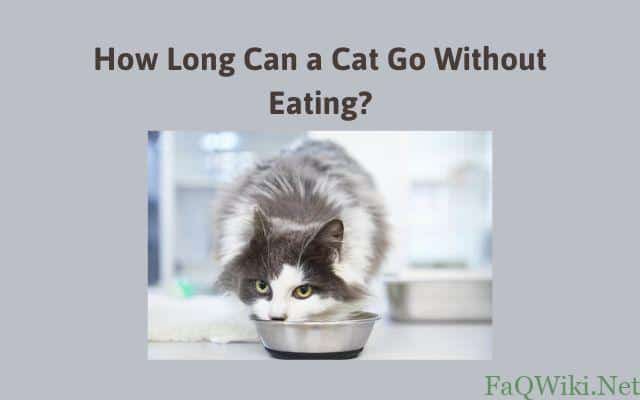How Long Can a Cat Go Without Eating?

How Long Can a Cat Go Without Eating? Cats are known for their love of food, and it’s no secret that they can be picky eaters. But what happens when a cat stops eating altogether? How long can a cat go without food before it becomes a serious problem? In this article, we’ll explore the topic of cat fasting and provide you with the information you need to ensure your furry friend stays healthy.

Understanding the Basics of Cat Metabolism
Before we dive into the topic of fasting, it’s important to understand how cats metabolize food differently from humans. Unlike humans, who use glucose for energy, cats rely on protein and fat as their primary energy sources. The liver stores glucose in cats and releases it as needed, but it’s not their primary source of fuel.
Factors That Affect a Cat’s Ability to Fast
The length of time a cat can go without food depends on a variety of factors, including age and weight, the presence of underlying health conditions, and the level of physical activity and exercise. Younger cats and those with a healthy weight can generally fast for longer periods than older cats or those who are overweight.
Warning Signs That Your Cat May Not Be Getting Enough Food
It’s essential to keep an eye on your cat’s eating habits and look out for signs that they’re not eating enough. Some of the most common signs of decreased appetite include a loss of appetite, weight loss, lethargy, and lack of energy, and dehydration. If you notice any of these symptoms, it’s essential to take action right away.
How Long Can a Fit Feline Survive Without Food?
While it’s never a good idea to let your cat go without food for an extended period, healthy cats can typically fast for a few days without any major issues. After three to four days, however, the cat’s body will begin to break down fat and muscle for energy, which can cause significant health problems.
It’s important to note that there’s a difference between fasting and starvation. Fasting is a conscious decision to withhold food, while starvation is the result of an involuntary lack of food. Starvation can cause liver failure, muscle wasting, and other health complications.
What Are the Adverse Consequences of Starvation in Cats?
When a cat stops eating, the body begins to break down fat and muscle for energy. While this can sustain the cat for a short period, it can have serious consequences if it goes on for too long. Prolonged fasting can lead to liver failure, muscle wasting, and other health problems.
When Should You Be Concerned About Your Cat’s Eating Habits?
If your cat has stopped eating or is eating significantly less than usual, it’s important to seek medical attention right away. Your veterinarian can assess your cat’s overall health and determine whether any underlying medical conditions are contributing to their decreased appetite.
Strategies for Encouraging a Cat to Eat
There are several strategies you can use to encourage your cat to eat. One of the most effective is to change the type or flavor of food you’re offering. Additionally, you can try feeding smaller, more frequent meals, using appetite stimulants, or even warming up the food to make it more appealing.
Conclusion
In conclusion, understanding how long cats can go without eating is essential for ensuring your furry friend stays healthy. While healthy cats can fast for a few days without major issues, it’s essential to keep an eye on your cat’s eating habits and take action if you notice any signs of decreased appetite. By working closely with your veterinarian, you can help your cat maintain a healthy appetite and overall wellbeing.
FAQs
What is the longest a healthy cat can go without eating?
A healthy cat can typically fast for a few days without any major issues. However, it’s important to keep an eye on their overall health and well-being during this time and seek veterinary attention if any concerning symptoms arise.
Can a cat die from not eating?
Yes, a cat can die from not eating for an extended period. Prolonged fasting can lead to serious health complications, including liver failure, muscle wasting, and other issues.
Are you alarmed by your cat’s sudden disinterest in food?
If your cat stops eating or is eating significantly less than usual, it’s important to seek veterinary attention right away. Your veterinarian can assess your cat’s overall health and determine whether any underlying medical conditions are contributing to their decreased appetite.
What are some strategies for encouraging a cat to eat?
There are several strategies you can use to encourage your cat to eat, including changing the type or flavor of food you’re offering, feeding smaller, more frequent meals, using appetite stimulants, or warming up the food to make it more appealing.
How can I prevent my cat from going without eating for too long?
To prevent your cat from going without eating for too long, it’s important to keep an eye on their eating habits and seek veterinary attention if you notice any signs of decreased appetite. Additionally, ensuring that your cat has access to fresh food and water at all times can help prevent fasting or starvation.
